
Vicksburg's Wright, Corunna Right On in Claiming LPD2 Championships
By
Steve Vedder
Special for MHSAA.com
June 3, 2023
ADA – If Michael Wright was a baseball player, he probably would've been called out on strikes a year ago.
Instead, the Vicksburg senior can celebrate after winning the 200 at Saturday's Lower Peninsula Division 2 Track & Field Finals at Forest Hills Eastern.
The road to the championship in the 200, via a time of 21.72, was anything but a straight line for Wright. An aspiring baseball player, he was cut from the Vicksburg squad as a freshman. His football career, by Wright's own admission, was "on and off." And then a year ago in his first track meet, Wright suffered a leg injury that virtually ended his season. He did return to finish fifth in the 200 at Finals while helping the 400 relay team to a 16th place.
So there is nothing to realistically explain how Wright found himself in the position Saturday at sweltering Forest Hills Eastern to win a championship. Except for returning this season to break the school record in the 200 four times in two months. Well, that and willpower and simple desire.
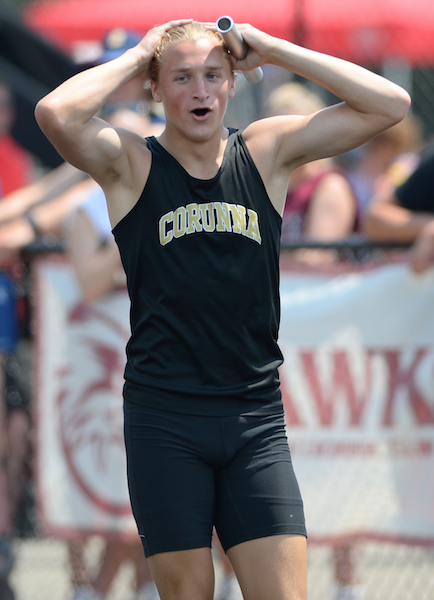 "I knew I could finish high, maybe in the top five. But this is better," said Wright, who credits drinking large quantities of milk for his resurgence. "I looked to football because I didn't think I could bounce back for track. But I overcame the bumps, the obstacles."
"I knew I could finish high, maybe in the top five. But this is better," said Wright, who credits drinking large quantities of milk for his resurgence. "I looked to football because I didn't think I could bounce back for track. But I overcame the bumps, the obstacles."
While Wright was jump-starting his track career, Corunna won the team title with 41 points. Mason and Forest Hills Eastern tied for second with 35. Whitehall was fourth with 33 points, and Frankenmuth fifth with 29 points.
Corunna coach Jeff Sawyer, who had never won a Finals title in 37 years coaching at Owosso and three more at Corunna, said the championship came after little fanfare during the season. Virtually right up until the time Corunna hauled off its first-place trophy, Sawyer said it was never really on his team's mind. The title came after the team managed only a runner-up finish at the Regional.
"We kind of low-keyed it," he said. "We knew scoring 40 points was possible. We lost to Frankenmuth by one point at the Regional. … We were a little disappointed we didn't win, but we had some good times today. We knew it was possible.
"Every day we just come and do what we do. We talk about getting better every day with PRs (personal records). And we're still getting better because we have some tough guys. Just competitive, tough kids. But we were the underdogs."
Corunna had only two firsts on Saturday, in the 400 relay (42.63) and Wyatt Bower in the long jump (22-8½).
Among the individual highlights was Frankenmuth senior Dalton DeBeau, who successfully defended his Finals title in the discus (171-6). He was fifth in that event as a sophomore and after winning a year ago, was considered a good bet to repeat.
"I kind of expected it," said DeBeau, who will compete at Michigan State next spring. "There wasn't a lot of pressure. I knew what had to be done. I threw 160 feet on my first throw to get in the finals, and that helped right away. I knew I could go all out."
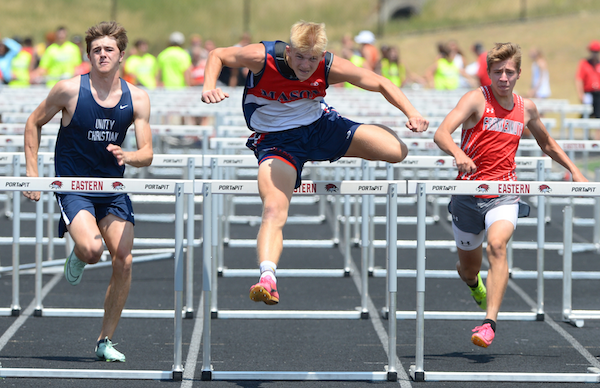 Berrien Springs' Jake Machiniak won the 100 (10.54) while the team also captured the 800 relay (1:28.18). Machiniak said his season hasn't been without its share of difficulties. There was a time when he couldn't seem to come out of the starting blocks smoothly. But beginning with the conference meet where he ran school record 10:73, Machiniak felt himself back on course.
Berrien Springs' Jake Machiniak won the 100 (10.54) while the team also captured the 800 relay (1:28.18). Machiniak said his season hasn't been without its share of difficulties. There was a time when he couldn't seem to come out of the starting blocks smoothly. But beginning with the conference meet where he ran school record 10:73, Machiniak felt himself back on course.
"There were ups and downs. I struggled in the middle of the season," he said. "But my teammates helped me through some difficulties. I came here to finish the job; I knew I could do something here."
Mason's Tyler Baker won the 100 hurdles (14.63) to complete a long journey that included finishing just ninth in last year's prelims. The success was as simple as putting in loads of offseason work.
"I practiced and did stuff about every day," he said. "I might not be the fastest, but I make up for that in form. It's a fine-tuning thing. Everyone wants to be faster."
Mason also got a championship from A.J. Mantel, who captured the 300 hurdles (38.90).
Among other highlights was Forest Hills Eastern senior Aiden Sullivan successfully defending a 2022 title on his own home turf. He won Saturday's 800 (1:53.92).
Adrian won the 3,200 relay (7:39.77), while Grand Rapids Christian took the 1,600 (3:24.49).
Alma had two individual winners in Michael Howey in the shot (55-08) and Jacob Dunlap in the high jump (6-7).
The other champs were Kyle Eberhard of Linden in the 1,600 (4:14.79), Whitehall's Trannon Ayler in the 400 (48.83), Freeland's T.J. Hansen in the 3,200 (9:11.56) and Sam Vesperman of Grosse Ile in the pole vault (15.01). Chelsea senior Jacob Nelson competed in the adaptive 100 (27.28), 200 (57.71) and shot put (6-6).
PHOTOS (Top) Vicksburg's Michael Wright celebrates after winning the 200 on Saturday. (Middle) Corunna's Tarick Bower enjoys a moment after anchoring the winning 400 relay. (Below) Mason's Tyler Baker, center, works to stay ahead in the 110 hurdles. (Photos by Dave McCauley/RunMichigan.com.)
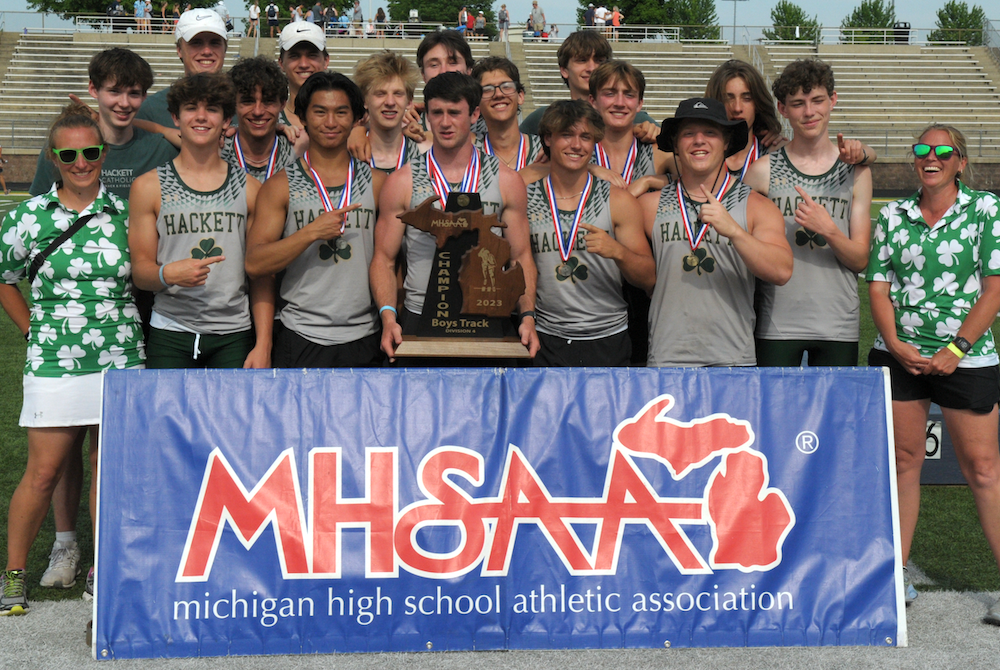
Thrower Claims Lone Individual Title to Lead Hackett to Team 3-Peat
By
Tom Lang
Special for MHSAA.com
June 3, 2023
Kalamazoo Hackett Catholic Prep just keeps winning and winning.
This time the Irish took home their fourth title in the last five Lower Peninsula Division 4 Track & Field Finals, on Saturday at Hudsonville.
Hackett’s only individual title was taken by discus winner Nathan Buchmann, a senior, who was fine knowing he was the shortest in stature among all the sizable competitors.
“In the offseason after football I worked out every day, working towards this goal,” he said after getting his medal. “I would say this takes 80 percent technique and 20 percent strength to throw the discus. So, length can help but if you have good technique and are really strong, that will play into it.
“I think we are very balanced throughout the meet today,” he said about teammates that scored points in finishes other than first place. “We have 13 guys here today, and we have people in a lot of the races. But I do not run; I have too short of legs to be a fast runner,” he said with a chuckle.
Buchmann had to work through a hip injury to compete this spring.
“I think the setbacks are what make you strong,” he said. “You can either give up through the setbacks or push forward and become better.”
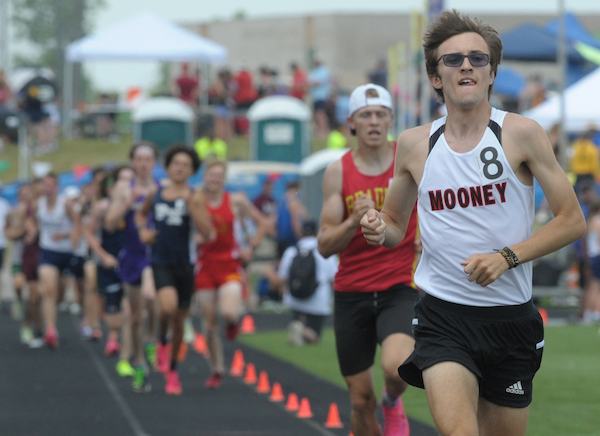 Coach Charissa Dean agreed.
Coach Charissa Dean agreed.
“The kids have big hearts,” she said after all the points were totaled and the Irish were on top once again, with 53. “They worked hard. They had a lot of potential when we started the season. And we had a lot of drive to put in the work, and we are happy the results came out the way they did.”
Reading was runner-up at 47 points, followed by Wyoming Potter’s House Christian with 42, then Fowler and Flint Beecher each with 37 points.
Senior Lezawe “Moses” Osterink, of Potter’s House Christian, placed second in 1,600 but took the 3,200 title as defending champ of both. He dominated the latter by lapping the field with a final lap kick that resembled more of a superhero speedster.
“Nobody really took it out that hard at the start,” he said. “There was a freshman (Marek Butkiewicz of Hackett) that tried to get the pace going quick, but me and Dakota (Dykhuis of Montabella) just kind of sat back and gradually pulled him through.
“We took it gradually, and I was just relying that I could kick.”
Kick did he ever. The trio were neck and neck the majority of the race in a grouping ahead of the pack.
“With 400 to go I just tried to go all out,” Osterink said. “I had a lot more left than I thought and I was pleased with the win. Not really the time, but that doesn’t matter, especially this hot out.”
The overall meet was in the low 90s/high 80s heat and searing sun all day. So, race officials allowed the unique opportunity for coaches to spray the runners with water and give them water bottles.
“It was very weird because I’ve never taken water to drink while I’m running, so I didn’t know how that would feel,” Osterink said. “And they were spraying us and hitting us in the face. It was kind of fun.”
Junior Tyler Lenn of Marine City Cardinal Mooney defeated Osterink at his own game in the 1,600.
“I’m feeling great,” Lenn said after grabbing the medal. “I said to a newspaper after one of my races (during the season) I was right where I wanted to be. This has been a long rebuilding process for me since an injury back in the fall, and I set a pretty high goal the day the injury happened. I was telling myself I needed to fulfill what I said I would do at the beginning of last cross country season. And that is what I did today.”
Lenn suffered an ankle sprain from a misstep that turned worse because he kept running through the season on it.
“Coming back from that was pretty tough, but I wouldn’t have it any other way,” he said. 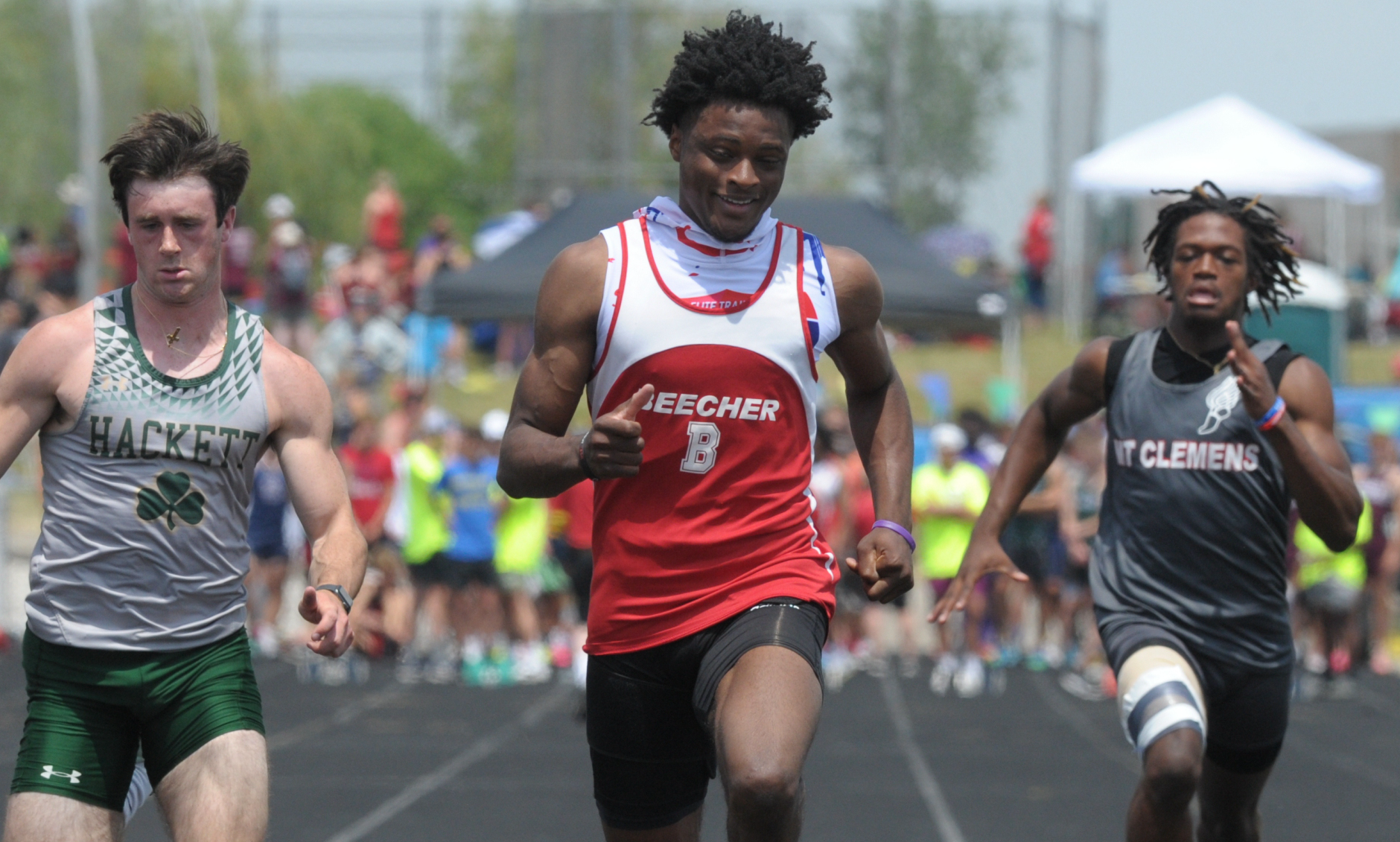 “Perseverance; I said from the beginning what I was going to do. I kept my eye on that target, and no matter the circumstances life threw at me, that I was going to make it happen and I am a man of my word.”
“Perseverance; I said from the beginning what I was going to do. I kept my eye on that target, and no matter the circumstances life threw at me, that I was going to make it happen and I am a man of my word.”
Jaylin Townsend, a senior from Flint Beecher, dominated the short races. He won the 100 dash (10.67) and 200 dash at 22 seconds flat. It was his third 100 win at a Finals.
“I put in a lot of work; I had to three-peat,” he said after the 100. “There’s a lot of great competition here, so I knew I had to come out and run my best.”
Concord in the 400 (43.72), Buckley in the 800 (1:30.76) and 1,600 (3:29.13) and Potter’s House in the 3,200 (8:14.18) were relay champs Saturday. Reading’s Tayshawn Bester won the 110 hurdles (15.13), and Athens’ Landen Bennett won the 300 (39.85). Caseville’s Nathan Feltner won the 400 (50.76), and Vestaburg’s Owen Patton claimed the 800 (1:55.11).
Fruitport Calvary Christian’s Bradley Richards won the high jump (6-10), and Peck’s Alex Affer won the long jump (23-4). McBain Northern Michigan Christian’s Isaac Bowden was first in pole vault (13-0), and Brown City’s Kyle Affer won shot put (49-2).
PHOTOS (Top) Kalamazoo Hackett Catholic Prep celebrates its third-straight LPD4 title Saturday. (Middle) Cardinal Mooney's Tyler Lenn, far right, sets the pace in the 1,600. (Below) Flint Beecher's Jaylin Townsend, middle, crosses the finish first for one of his two sprint championships. (Photos by Ken Swart/RunMichigan.com.)

